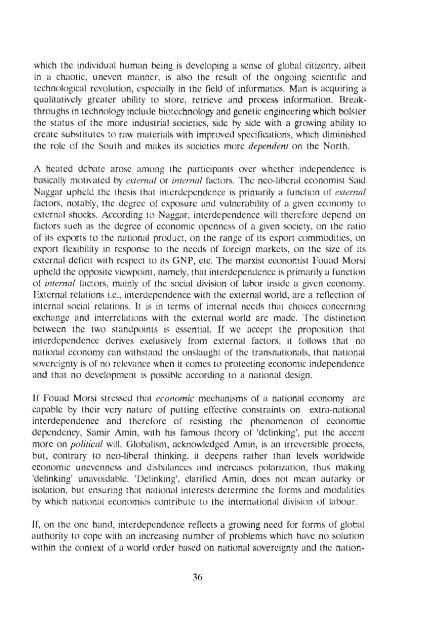ifda dossier 74 - Dag Hammarskjöld Foundation
ifda dossier 74 - Dag Hammarskjöld Foundation
ifda dossier 74 - Dag Hammarskjöld Foundation
Create successful ePaper yourself
Turn your PDF publications into a flip-book with our unique Google optimized e-Paper software.
which the individual human being is developing a sense of global citizcnry, albeit<br />
in a chaotic, uneven manner, is also the result of the ongoing scientific and<br />
technological revolution, especially in the field of informaties. Man is acquiring a<br />
qualitatively greater ability to store, retrieve and process information. Break-<br />
throughs in technology include bioteehnology and genetic engineering which bolster<br />
the status of the more industrial societies, side by side with a growing ability to<br />
create substitutes to raw materials with improved specifications, which diminished<br />
the role of the South and makes its societies more dependent on the North.<br />
A heated debate arose among the participants over whether independence is<br />
basically motivated by external or iniernnl factors. The neo-liberal economist Said<br />
Naggar upheld the thesis that interdependence is primarily a function of external<br />
factors, notably, the degree of exposure and vulnerability of a given economy to<br />
external shocks. According to Naggar, interdependence will therefore depend on<br />
factors such as the degree of economic openness of a given society, on the ratio<br />
of its exports to the national product, on the range of its export commodities, on<br />
export flexibility in response to the needs of foreign markets, on the size of its<br />
external deficit with respect to its GNP, etc. '13e marxist econon~ist Fouad Morsi<br />
upheld the opposite viewpoint, namely, that interdependence is primarily a function<br />
of internal factors, mainly of the social division of labor inside a given economy.<br />
Rxternal relations i.e., interdependence with the external world, are a reflection of<br />
internal social relations. It is in terms of internal needs th;it choices concerning<br />
exchange and interrelations with the external world are made. "I'he distinction<br />
between the two standpoints is essential. If we accept the proposition that<br />
interdependence derives exclusively from external factors. it follows [hiit no<br />
national economy can withstand the onslaught of the transnationals, that national<br />
sovereignty is of no relevance when it comes to protecting economic independence<br />
and that no development is possible according to a national design.<br />
If Fouad Morsi stressed that economic n~echanisms of a national economy are<br />
capable by their very nature of putting effective constraints on extra-national<br />
interdependence and therefore of resisting the phenomenon of economic<br />
dependency, Samir Amin, with his famous theory of 'delinking', put the accent<br />
more on political will. Globalism, acknowledged Amin, is an irreversible process,<br />
but, contrary to nco-liberal thinking, it deepens rather than levels worldwide<br />
economic unevenness and disbalances and increases polarization, thus making<br />
'delinking' unavoidable. 'Delinking', clarified Amin, does not mean autarky or<br />
isolation, but cnsuringlhat national interests determine the forms and modalities<br />
by which national economic?! contribute to the international division of labour.<br />
If, on the one hand, interdependence reflects a growing need for forms of global<br />
authority to cope with an increasing number of problems which have no solution<br />
within the context of a world order based on national sovereignty and the nation-
















